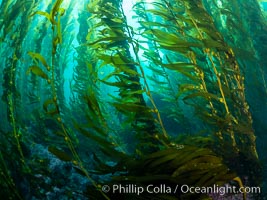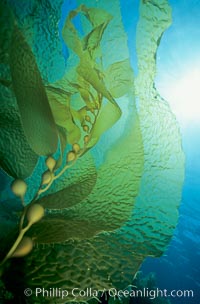
Kelp frond showing pneumatocysts.
Species: Giant kelp, Macrocystis pyrifera
Location: San Clemente Island, California
Image ID: 00627
Species: Giant kelp, Macrocystis pyrifera
Location: San Clemente Island, California
Image ID: 00627
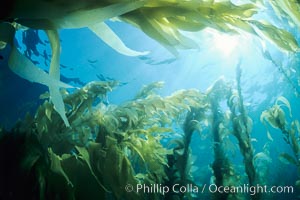
A kelp forest, with sunbeams passing through kelp fronds. Giant kelp, the fastest growing plant on Earth, reaches from the rocky bottom to the ocean's surface like a submarine forest.
Species: Giant kelp, Macrocystis pyrifera
Location: San Clemente Island, California
Image ID: 02411
Species: Giant kelp, Macrocystis pyrifera
Location: San Clemente Island, California
Image ID: 02411
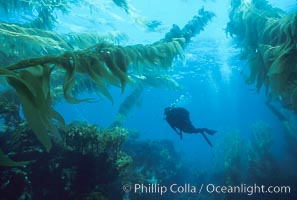
A SCUBA diver swims through a giant kelp forest which is tilted back by strong ocean currents. Giant kelp, the fastest plant on Earth, reaches from the rocky bottom to the ocean's surface like a submarine forest.
Species: Giant kelp, Macrocystis pyrifera
Location: San Clemente Island, California
Image ID: 01107
Species: Giant kelp, Macrocystis pyrifera
Location: San Clemente Island, California
Image ID: 01107
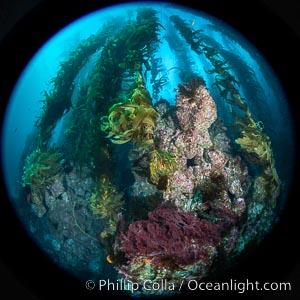
The Kelp Forest and Rocky Reef of San Clemente Island. Giant kelp grows rapidly, up to 2' per day, from the rocky reef on the ocean bottom to which it is anchored, toward the ocean surface where it spreads to form a thick canopy. Myriad species of fishes, mammals and invertebrates form a rich community in the kelp forest. Lush forests of kelp are found throughout California's Southern Channel Islands.
Species: Giant kelp, Macrocystis pyrifera
Location: San Clemente Island, California
Image ID: 38494
Species: Giant kelp, Macrocystis pyrifera
Location: San Clemente Island, California
Image ID: 38494
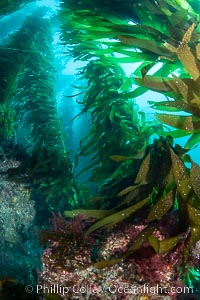
The Kelp Forest and Rocky Reef of San Clemente Island. Giant kelp grows rapidly, up to 2' per day, from the rocky reef on the ocean bottom to which it is anchored, toward the ocean surface where it spreads to form a thick canopy. Myriad species of fishes, mammals and invertebrates form a rich community in the kelp forest. Lush forests of kelp are found throughout California's Southern Channel Islands.
Species: Giant kelp, Macrocystis pyrifera
Location: San Clemente Island, California
Image ID: 38495
Species: Giant kelp, Macrocystis pyrifera
Location: San Clemente Island, California
Image ID: 38495
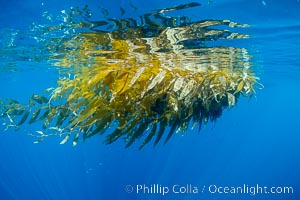
Drift kelp paddy floating on the ocean surface, San Diego.
Species: Giant kelp, Macrocystis pyrifera
Location: San Diego, California
Image ID: 38533
Species: Giant kelp, Macrocystis pyrifera
Location: San Diego, California
Image ID: 38533
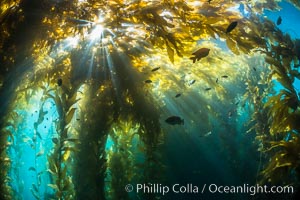
Sunlight streams through giant kelp forest. Giant kelp, the fastest growing plant on Earth, reaches from the rocky reef to the ocean's surface like a submarine forest.
Species: Giant kelp, Macrocystis pyrifera
Location: Catalina Island, California
Image ID: 33433
Species: Giant kelp, Macrocystis pyrifera
Location: Catalina Island, California
Image ID: 33433
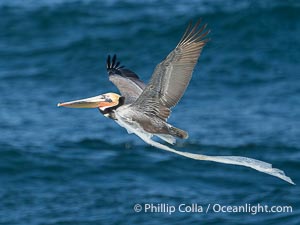
Brown pelican flying while entangled in plastic bag wrapped around its neck. I believe the pelican probably became entangled in the bag by mistaking the floating plastic for food and diving on it, spearing it in such a way that the bag has lodged around the pelican's neck.
Species: Brown Pelican, Pelecanus occidentalis californicus, Pelecanus occidentalis
Location: La Jolla, California
Image ID: 40093
Species: Brown Pelican, Pelecanus occidentalis californicus, Pelecanus occidentalis
Location: La Jolla, California
Image ID: 40093
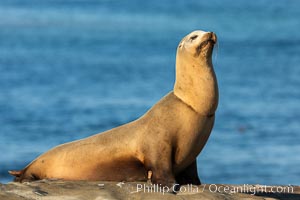
California sea lion wounded from entanglement in fishing line, La Jolla.
Species: California sea lion, Zalophus californianus
Location: La Jolla, California
Image ID: 35156
Species: California sea lion, Zalophus californianus
Location: La Jolla, California
Image ID: 35156
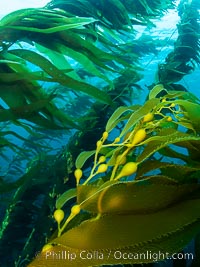
Kelp fronds showing pneumatocysts, bouyant gas-filled bubble-like structures which float the kelp plant off the ocean bottom toward the surface, where it will spread to form a roof-like canopy.
Species: Giant kelp, Macrocystis pyrifera
Location: San Clemente Island, California
Image ID: 38498
Species: Giant kelp, Macrocystis pyrifera
Location: San Clemente Island, California
Image ID: 38498
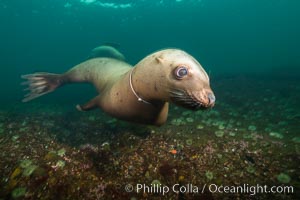
Steller sea lion entanglement, line wrapped around the sea lion's neck, injury and infection from the wound can weaken and kill the animal, Norris Rocks, Hornby Island, British Columbia, Canada.
Species: Steller sea lion, Eumetopias jubatus
Location: Hornby Island, British Columbia, Canada
Image ID: 32668
Species: Steller sea lion, Eumetopias jubatus
Location: Hornby Island, British Columbia, Canada
Image ID: 32668
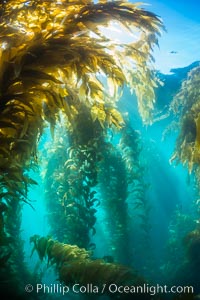
Sunlight streams through giant kelp forest. Giant kelp, the fastest growing plant on Earth, reaches from the rocky reef to the ocean's surface like a submarine forest.
Species: Giant kelp, Macrocystis pyrifera
Location: Catalina Island, California
Image ID: 33434
Species: Giant kelp, Macrocystis pyrifera
Location: Catalina Island, California
Image ID: 33434
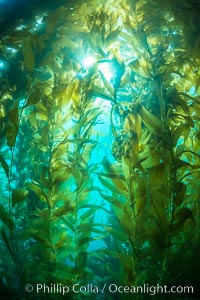
Sunlight streams through giant kelp forest. Giant kelp, the fastest growing plant on Earth, reaches from the rocky reef to the ocean's surface like a submarine forest.
Species: Giant kelp, Macrocystis pyrifera
Location: Catalina Island, California
Image ID: 33435
Species: Giant kelp, Macrocystis pyrifera
Location: Catalina Island, California
Image ID: 33435
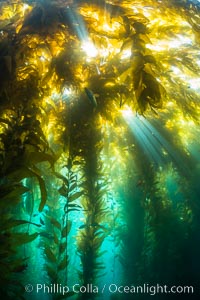
Sunlight streams through giant kelp forest. Giant kelp, the fastest growing plant on Earth, reaches from the rocky reef to the ocean's surface like a submarine forest.
Species: Giant kelp, Macrocystis pyrifera
Location: Catalina Island, California
Image ID: 33436
Species: Giant kelp, Macrocystis pyrifera
Location: Catalina Island, California
Image ID: 33436
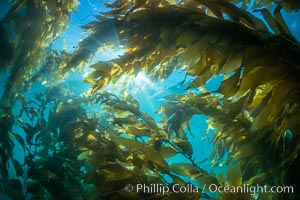
Sunlight streams through giant kelp forest. Giant kelp, the fastest growing plant on Earth, reaches from the rocky reef to the ocean's surface like a submarine forest.
Species: Giant kelp, Macrocystis pyrifera
Location: Catalina Island, California
Image ID: 33437
Species: Giant kelp, Macrocystis pyrifera
Location: Catalina Island, California
Image ID: 33437
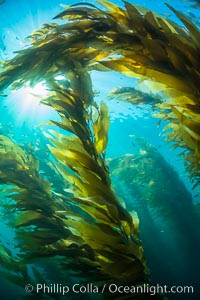
Sunlight streams through giant kelp forest. Giant kelp, the fastest growing plant on Earth, reaches from the rocky reef to the ocean's surface like a submarine forest.
Species: Giant kelp, Macrocystis pyrifera
Location: Catalina Island, California
Image ID: 33438
Species: Giant kelp, Macrocystis pyrifera
Location: Catalina Island, California
Image ID: 33438
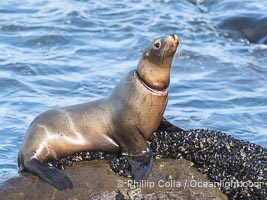
California sea lion entangled in fishing line, deep laceration around neck, Point La Jolla.
Species: California sea lion, Zalophus californianus
Location: La Jolla, California
Image ID: 40486
Species: California sea lion, Zalophus californianus
Location: La Jolla, California
Image ID: 40486
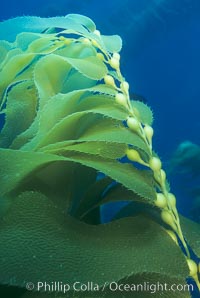
Kelp frond showing pneumatocysts.
Species: Giant kelp, Macrocystis pyrifera
Location: Santa Barbara Island, California
Image ID: 02435
Species: Giant kelp, Macrocystis pyrifera
Location: Santa Barbara Island, California
Image ID: 02435
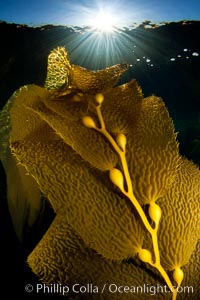
Kelp fronds and pneumatocysts. Pneumatocysts, gas-filled bladders, float the kelp plant off the ocean bottom toward the surface and sunlight, where the leaf-like blades and stipes of the kelp plant grow fastest. Giant kelp can grow up to 2' in a single day given optimal conditions. Epic submarine forests of kelp grow throughout California's Southern Channel Islands.
Species: Giant kelp, Macrocystis pyrifera
Location: San Clemente Island, California
Image ID: 25396
Species: Giant kelp, Macrocystis pyrifera
Location: San Clemente Island, California
Image ID: 25396
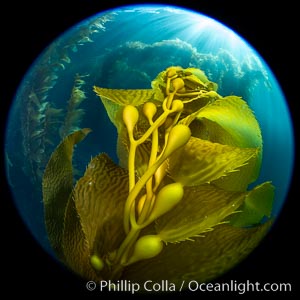
Kelp fronds and pneumatocysts. Pneumatocysts, gas-filled bladders, float the kelp off the ocean bottom toward the surface and sunlight, where the leaf-like blades and stipes of the kelp plant grow fastest. Catalina Island, California.
Species: Giant kelp, Macrocystis pyrifera
Location: Catalina Island, California
Image ID: 37282
Species: Giant kelp, Macrocystis pyrifera
Location: Catalina Island, California
Image ID: 37282
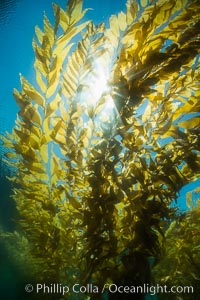
The Kelp Forest offshore of La Jolla, California. A kelp forest. Giant kelp grows rapidly, up to 2' per day, from the rocky reef on the ocean bottom to which it is anchored, toward the ocean surface where it spreads to form a thick canopy. Myriad species of fishes, mammals and invertebrates form a rich community in the kelp forest. Lush forests of kelp are found throughout California's Southern Channel Islands.
Species: Giant kelp, Macrocystis pyrifera
Image ID: 30986
Species: Giant kelp, Macrocystis pyrifera
Image ID: 30986
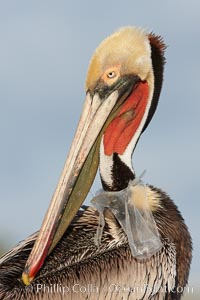
A California brown pelican entangled in a plastic bag which is wrapped around its neck. This unfortunate pelican probably became entangled in the bag by mistaking the floating plastic for food and diving on it, spearing it in such a way that the bag has lodged around the pelican's neck. Plastic bags kill and injure untold numbers of marine animals each year.
Species: Brown Pelican, Pelecanus occidentalis, Pelecanus occidentalis californicus
Location: La Jolla, California
Image ID: 22562
Species: Brown Pelican, Pelecanus occidentalis, Pelecanus occidentalis californicus
Location: La Jolla, California
Image ID: 22562
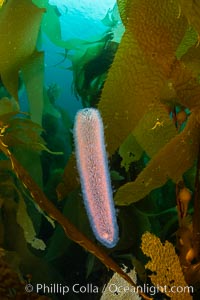
Pyrosome in Kelp Forest, Santa Barbara Island.
Species: Pyrosome, Pyrosoma
Location: Santa Barbara Island, California
Image ID: 35826
Species: Pyrosome, Pyrosoma
Location: Santa Barbara Island, California
Image ID: 35826
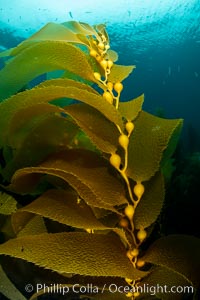
Kelp fronds showing pneumatocysts, bouyant gas-filled bubble-like structures which float the kelp plant off the ocean bottom toward the surface, where it will spread to form a roof-like canopy.
Location: Santa Barbara Island, California
Image ID: 35827
Location: Santa Barbara Island, California
Image ID: 35827
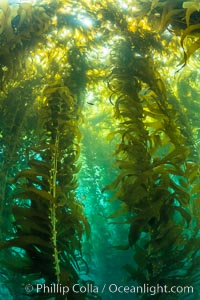
Sunlight glows throughout a giant kelp forest. Giant kelp, the fastest growing plant on Earth, reaches from the rocky reef to the ocean's surface like a submarine forest.
Species: Giant kelp, Macrocystis pyrifera
Location: San Clemente Island, California
Image ID: 37086
Species: Giant kelp, Macrocystis pyrifera
Location: San Clemente Island, California
Image ID: 37086
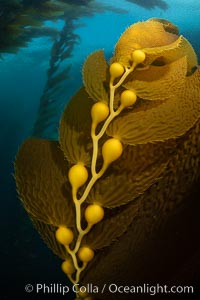
Kelp fronds and pneumatocysts. Pneumatocysts, gas-filled bladders, float the kelp plant off the ocean bottom toward the surface and sunlight, where the leaf-like blades and stipes of the kelp plant grow fastest. Giant kelp can grow up to 2' in a single day given optimal conditions. Epic submarine forests of kelp grow throughout California's Southern Channel Islands.
Species: Giant kelp, Macrocystis pyrifera
Location: San Clemente Island, California
Image ID: 37100
Species: Giant kelp, Macrocystis pyrifera
Location: San Clemente Island, California
Image ID: 37100
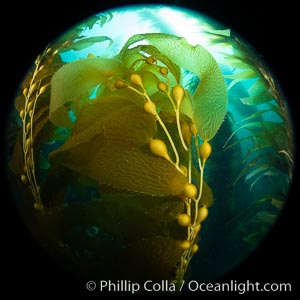
Kelp fronds and pneumatocysts. Pneumatocysts, gas-filled bladders, float the kelp off the ocean bottom toward the surface and sunlight, where the leaf-like blades and stipes of the kelp plant grow fastest.
Species: Giant kelp, Macrocystis pyrifera
Location: Catalina Island, California
Image ID: 37297
Species: Giant kelp, Macrocystis pyrifera
Location: Catalina Island, California
Image ID: 37297
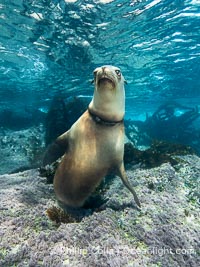
Female California Sea Lion with Severe Fishing Line Entanglement Injury, in the Coronado Islands, Baja California, Mexico. The line is buried in the sea lion's tissue so far that is difficult to see. It is possible this synthetic line will continue to cut into the skin of this sea lion until it succumbs to infection or blood loss. I have never seen any marine mammal rescue teams at the Coronado islands and suspect this poor animal will not live long.
Species: California sea lion, Zalophus californianus
Location: Coronado Islands (Islas Coronado), Baja California, Mexico
Image ID: 39959
Species: California sea lion, Zalophus californianus
Location: Coronado Islands (Islas Coronado), Baja California, Mexico
Image ID: 39959
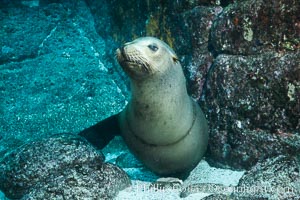
California sea lion with scar around neck from monofiliment fishing line entanglement at Los Islotes in the Sea of Cortez, Mexico.
Species: California sea lion, Zalophus californianus
Location: Sea of Cortez, Baja California, Mexico
Image ID: 31234
Species: California sea lion, Zalophus californianus
Location: Sea of Cortez, Baja California, Mexico
Image ID: 31234
